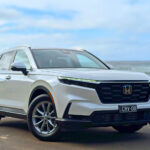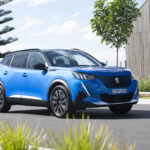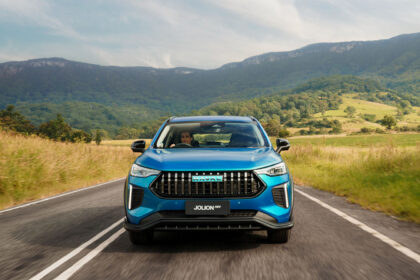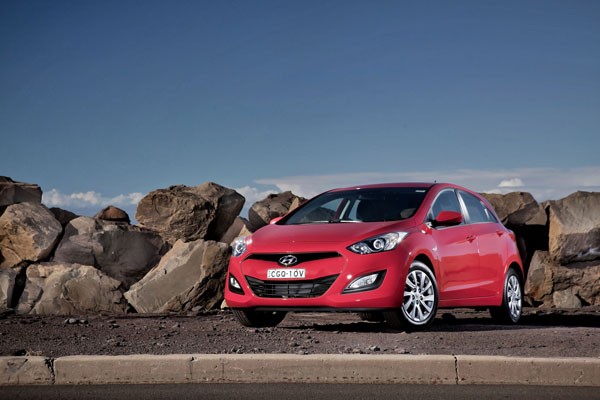
Many who commented on the shape of the i30 Premium during our test period loved its sleek, stylish lines
Image is everything in the minds of many car buyers. Motoring journalists have a saying, “People pay big dollars for the front two inches of their cars”.
The Hyundai i30 Premium CRDi we have just returned after an extended review is a classic case in point. It was positively crammed with luxury items of the sort found in big name Euro cars: leather trim; a panoramic glass sunroof; satellite navigation with Suna traffic control; powered front seats with heating; connectivity by way of Aux, USB and iPod/iPhone inputs, as well as Bluetooth; hands-free phone; audio streaming; keyless go. The list just goes on and on.
Despite the huge levels of standard equipment, people gasped when we told them the i30 Premium CRDi had a recommended retail of $32,590 – saying it was a lot of money for a Korean car.
Which brings us back to our comments about image being everything – one of the big name German marques in this class would come in at close to $70,000 if loaded with the same gear. Yet many would have described the $70,000 price tag as being a bargain for a Merc, Beemer or Audi.
Logical? Not…
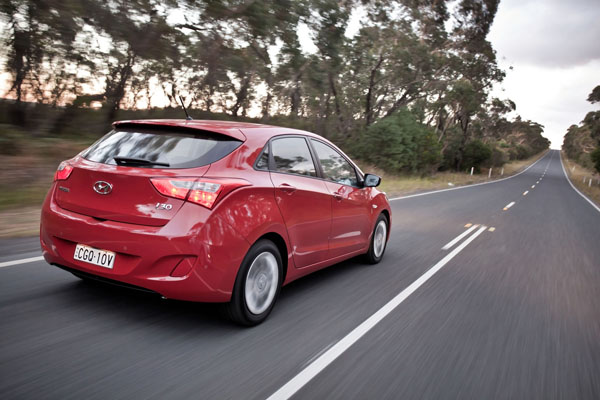 Power is provided by a 1.6-litre turbo-diesel engine with a high-tech six-speed automatic transmission. The engine produces up to 94 kilowatts of power, and 255 Newton metres of torque. We found the transmission nicely interactive as it responded quickly to our desire for a different gear by way of the ‘throttle’ pedal.
Power is provided by a 1.6-litre turbo-diesel engine with a high-tech six-speed automatic transmission. The engine produces up to 94 kilowatts of power, and 255 Newton metres of torque. We found the transmission nicely interactive as it responded quickly to our desire for a different gear by way of the ‘throttle’ pedal.
At motorway speeds our Hyundai i30 CRDi had fuel consumption in the six to seven litres per hundred kilometres range. This increased to nine to ten litres per hundred in the hard grind of typical city commuting. The best European turbo-diesel engines in this class can do significantly better than this, showing that the Asian car makers still have a distance to go in their designs of car diesel engines. Knowing Hyundai, that won’t take long.
Hyundai i30 Premium is pleasant to drive, albeit with the nose heavy feeling of any front-drive car. Interestingly, the driver can vary the feel of the car by dialling up one of three steering modes with Hyundai’s fascinating Flex Steer system.
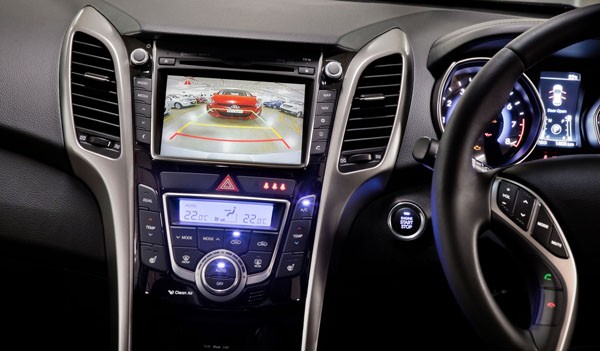
In ‘Normal’, Flex Steer provides a balance between steering input and feedback, making it ideal for the majority of roads; ‘Comfort’ reduces the weight of steering, allowing for effortless manoeuvring and relaxed driving cruising; ‘Sport’ increases steering weight and feedback for increased driver involvement.
The suspension and steering have been tuned for Australian conditions. However the semi sporting setup designed for keen Aussie drivers means it’s over firm on rough and ready back roads.
Instruments are made easy to read with sports-style layout and blue back lighting. The engine fires up via a start/stop button, while an electronic park brake makes life simpler. The seats are comfortable and the ergonomics work in a sensible, comfortable manner.
Hyundai i30 has been praised as, “one of the safest in the small-car category” by ANCAP (Australasian New Car Assessment Program), after gaining the maximum five-star safety rating.
Seven airbags and rear parking sensors are standard across the Hyundai i30 range. There’s a full suite of active safety technology, with ESC, TCS, ABS, EBD and BAS all being standard in every model. The budget priced Hyundai i30 is on a par with far more expensive passenger vehicles.
Image is everything, and despite above remarks that could be taken as being sarcastic I have to admit that I’m as good a consumer as most others around me. Give me $70,000 and my heart would see me in a Merc, Beemer or Audi any day. But the head still says Hyundai i30 Premium CRDi makes a lot more sense…
AT A GLANCE
MODEL RANGE
Active 1.8-litre petrol four-door sedan: $20,990 (manual), $22,990 (automatic)
Elite 1.8-litre petrol four-door sedan: $24,590 (manual), $26,590 (automatic)
Premium 1.8-litre petrol four-door sedan: $29,990 (automatic)
Active 1.6-litre turbo-diesel four-door sedan: $23,590 (manual), $25,590 (automatic)
Elite 1.6-litre turbo-diesel four-door sedan: $27,190 (manual), $29,190 (automatic)
Premium 1.6-litre turbo-diesel four-door sedan: $32,590 (automatic)
FEATURES
ABS Brakes: Standard in all models
Automatic Transmission: $2000 option in Active and Elite, standard in Premium
Cruise Control: Standard in all models
Dual Front Airbags: Standard in all models
Front Side Airbags: Standard in all models
Electronic Stability Program: Standard in all models
Rear Parking Sensors: Standard in all models
Reversing Camera: Standard in Elite and Premium
USB/Auxiliary Audio Inputs: Standard in all models
Bluetooth: Standard in all models
Steering Wheel Mounted Controls: Standard in all models
SPECIFICATIONS (Hyundai i30 1.6-litre turbo-diesel four-door sedan)
ENGINE:
Capacity: 1.582 litres
Configuration:Four cylinders in line
Head Design: DOHC, four valves per cylinder
Compression Ratio: 17.3:1
Bore/Stroke: 77.2 mm x 84.5 mm
Maximum Power: 94 kW @ 4000 rpm
Maximum Torque: 260 Nm @ 1900-2750 rpm
DRIVELINE:
Driven Wheels: Front
Manual Transmission: Six-speed
Automatic Transmission: Six-speed
Final Drive Ratio: 3.941:1
DIMENSIONS, WEIGHT AND CAPACITIES:
Length: 4300 mm
Wheelbase: 2650 mm
Width: 1780 mm
Height: 1470 mm
Turning Circle: 10.6 metres
Kerb Mass: 1285-1388 kg
Fuel Tank Capacity: 50 litres
Towing Ability: Not supplied
Boot Capacity: 378 litres
SUSPENSION AND BRAKES:
Front Suspension: MacPherson struts
Rear Suspension: Torsion beam
Front Brakes: Ventilated disc
Rear Brakes: Disc
FUEL CONSUMPTION:
Type: Diesel
Combined Cycle (ADR 81/02): 4.5 L/100km
GREEN VEHICLE GUIDE RATINGS:
Greenhouse Rating: 8.5/10
Air Pollution Rating: 5/10
STANDARD WARRANTY:
Five years/unlimited km




